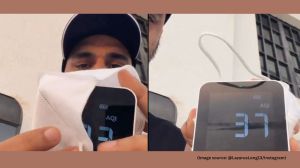Pune in panic,Govt to map each victims virus trail
Two days after the death of Reeda Sheikh,Pune District Collector told doctors not to refer 'any and every case of seasonal flu' to the already over-stretched Naidu Hospital.
Two days after the death of Reeda Sheikh,as another girl from her St Annes School,a Class X student,tested positive for the H1N1 virus on Wednesday,the District Collector called an urgent meeting of doctors and told them not to refer any and every case of seasonal flu to the already over-stretched Naidu Hospital.
Naidu Hospital and Aundh General Hospital are the two government establishments in the city designated to treat swine flu. Together,these have 50 beds Naidu that started off with 20 having raised its capacity recently to 40 and Aundh,10.
But given the panic after Reedas death and the number of cases already reported in the city,the government health department announced it will add another 200 beds exclusively for swine flu treatment in the next 15 days.
So large did the crowd become that Pune Municipal Commissioner Mahesh Zagade had to step in. District Collector Chandrakant Dalvi said that 15 Corporation-run hospitals would be enlisted where samples could also be collected.
We urge doctors and hospitals to refrain from referring seriously ill patients to Naidu Hospital. Private practitioners should also examine seasonal flu cases instead of going into a panic mode, Dalvi said.
The National Institute of Virology today received 90 samples for screening of which 60 were from Pune. We cannot examine and test each and every sample related to seasonal flu, said A C Mishra,Director,NIV. There is really no need to panic, he said.
Simultaneously,the government has begun work to map the transmission dynamics of the H1N1 virus active in India as part of its strategy to check the outbreak. Epidemiological investigations have begun with the Indian Council of Medical Research working closely with National Institute of Virology,Pune and National Institute of Communicable Diseases,Delhi.
This includes an assessment of the severity of illness,of the speed of the viruss spread and of how long the infection is likely to last.
The study results of which should be available in a few weeks will give us insight into the future of the currently circulating novel strain of influenza A H1N1. We have been looking at each case,the primary infected person,the secondary contacts,contacts of the infected people,to see how long will it take for the infected person cease to transmit virus, said V M Katoch,Secretary,Health Research,and DG ICMR.
In many models from abroad,initial findings have suggested that an infected individual transmits swine flu with diminishing probability to each susceptible individual he/she encounters. The number of susceptible individuals decreases as the incidence i.e.,the number of individuals infected per unit time increases.
At a certain point,the epidemic curve peaks,and subsequently declines,because infected individuals recover and cease to transmit the virus. To map this in India,ICMR officials say,will be vital in active surveillance where infections in humans have been identified. It will also help study healthcare workers and contacts who are exposed to patients infected with the virus to see if they get infected.
Meanwhile,the family of Reeda Shaikh will file an FIR at the Bund Garden police station in the city tomorrow,said lawyer Asif Lampwala. Also,legal notices will be issued to Jehangir Hospital,Ruby Hall Clinic and Sanjay Aggarwal,the general practitioner who first treated Reeda in his clinic before referring her to Jehangir Hospital,he said.
At Aggarwals clinic on Sachapir Street in the Camp area,his receptionist said he was unavailable for comment. As first reported by The Indian Express today,the Central Health Ministry team suspects Reeda got infected while visiting Aggarwals clinic for a routine cough and cold in the third week of July. The team said the GP,before examining Reeda,had attended to a patient who later tested positive for H1N1.
- 01
- 02
- 03
- 04
- 05































